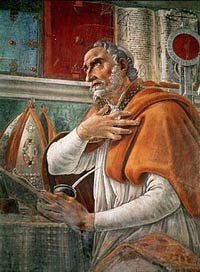
| Born: Nov 13, 354 in Thagaste, Numidia (now Souk Ahras, Algeria) |
| Died: Aug 28, 430 (at age 75) in Hippo Regius, Numidia (now modern-day Annaba, Algeria) |
| Nationality: Latin |
| Fields: Christian theology |
| Famous For: Bishop of Hippo Regius |
Saint Augustine of Hippo (354-430), a Christian theologian, is ranked first among the early fathers of the church.
Family Life and Early Years
Augustine, whose Latin name was Aurelius Augustinus, was born at Tagaste in Numidia, which is now the Algerian city of Souk Ahras. Then it was part of Rome’s African empire. His mother, Monica, is also a saint. Patricius, his father, recognized his intelligence early and made sure he received a stellar education.
Augustine went to school at Carthage. As a young man, he began to study various philosophies and taught grammar in Tagaste and then rhetoric in Carthage. But Augustine thought his students were so undisciplined that he tried to develop a school in Rome. However, the Roman students were indifferent and did not pay him for his services.
As a result, he went to Milan in 384 to take a position as a teacher of rhetoric. He returned to Christianity under the influence of Saint Ambrose, who was then the bishop of Milan.
Augustine and Manichaeism
Augustine began life as a Christian, but when he was a young man, he converted to Manichaeism, a popular philosophy which posited a world divided between good and evil. For many years he led a life of dissolution. During this time he had a mistress and a son born out of wedlock.
After Augustine converted to Christianity in 389, he abandoned his mistress, even though his son had also been converted to Christianity. But even before this, Augustine became disillusioned with Manichaeism and Monica, his mother, urged him to rejoin the Christian faith. She also urged him to abandon his mistress and enter into a real marriage. But Augustine neither married, returned to the mother of his child, nor to another woman that he had taken as a mistress. Augustine’s friend, Alypius, who was the bishop of Tagaste, also warned him against marrying.
Soon after his conversion, both Augustine’s mother and his son died and he turned his family’s estate into a monastery.
Augustine’s Conversion
Augustine’s’ conversion to Christianity was a watershed moment for the Catholic Church because he produced many great writings that defended the church. Some of them are influential even today. Among the concepts that he explored were those of just wars and original sin.
He also taught that human freedom was dependent on the grace of Jesus Christ. Two of his works in particular, The City of God and Confessions, are still widely read today. The City of God is a defense of Christianity and the Catholic Church, while Confessions is an account of his early life and conversion.
Works and Philosophy
Augustine believed that human beings were made up of a perfect connection of body and soul, or at least the union was perfect until the Fall in the Garden of Eden. He also studied astrology and believed it to be a legitimate science. He did not believe that God created the universe in a literal six days, but on the other hand, he did believe that Christ would literally set up a 1,000 year reign on earth, though it would not be of the flesh.
Augustine’s Later Years
Augustine became the bishop of the North African city of Hippo in 395. He died during the siege of the Vandals in 430. He is a saint in the Catholic and Anglican churches and he is the patron saint of theologians, printers, brewers and many cities around the world. His feast day is August 28, which was the day he died.